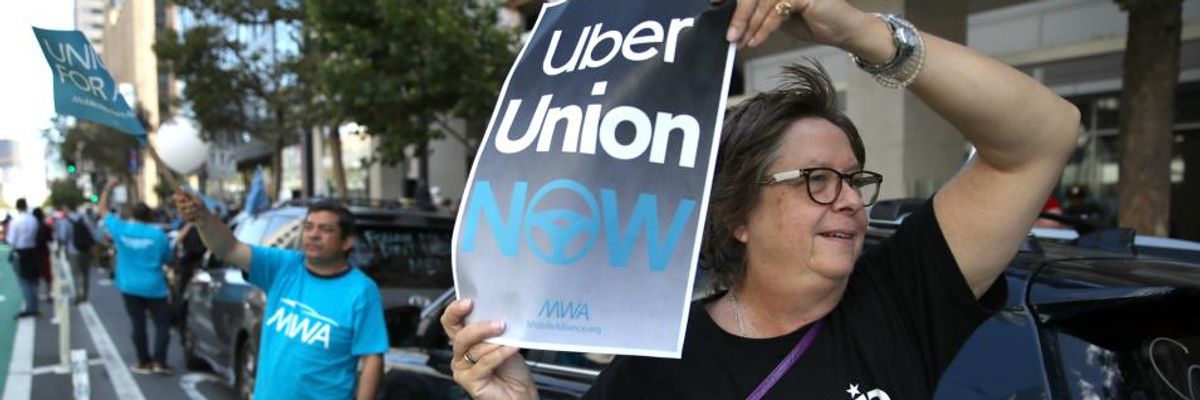Update:
The California state Assembly passed AB 5 on Wednesday by a preliminary vote of 56-15, according to the Wall Street Journal.
Earlier:
As labor advocates celebrated a "historic win" for members of the so-called "gig economy" nationwide, passage of a bill aimed at companies like Uber and Lyft by the state Senate of California on Tuesday night exposed a telling gap between members of the Democratic Party demonstrating fealty to worker-friendly policies and those holding back due to closer ties with powerful Silicon Valley companies.
"By approving AB 5, the California legislature solidified our state's position as the national leader on workplace rights, setting the standard for the rest of the country to follow." --Art Pulaski, California Labor FederationThe bill in question, known as AB 5 and passed by the Senate in a 29 to 11 vote the Democratic-controlled chamber, would allow workers like those who drive for ride-service, delivery workers, and other companies be classified as employees, as opposed to contractors, affording them the same rights and protections as regular employees and increasing protections for all those employed in the so-called "gig economy."
While AB 5 is now headed back to the state Assembly, it is expected to receive passage there before heading to the desk of Democratic Gov. Gavin Newsom, who has indicated he will sign it into law. The California Labor Federation was among those celebrating.
"By approving AB 5, the California legislature solidified our state's position as the national leader on workplace rights, setting the standard for the rest of the country to follow," said Art Pulaski, executive secretary-treasurer and chief officer of the CLF, in a statement.
"The misclassification of workers creates a corrosive effect that ripples through our entire economy," Pulaski continued, "undermining our laws to protect and support working people. AB 5 is a powerful counter to the corporate greed and rampant exploitation that's driving inequality across our state in emerging and traditional industries, alike. This historic victory clears the way for the bill to become law, setting workers and their families on a path to a better future and ending abuses that are all-too-common."
As Faiz Siddiqui detailed in the Washington Post on Wednesday, the battle over AB 5 in California has exposed a rift between Democrats cut from the Obama and Clinton wing of the party from more progressive members who are willing to put the rights and needs of gig economy workers ahead of the interests of Silicon Valley giants like Lyft and Uber. Siddiqui reports:
The struggle has illuminated a deepening divide within the Democratic Party over establishment pro-corporate sensibilities, which progressives say has come at the expense of workers who have suffered under the gig economy. The party has become fiercely critical of the Clinton- and Obama-era moves to Big Tech and Wall Street, a sentiment most vocally expressed by presidential candidate Elizabeth Warren and freshmen congresswomen forming a cadre known as "the Squad."
As recently as this week, the candidate who most represents what political observers see as the establishment wing of the party -- former vice president Joe Biden -- had declined to take a stance on AB5 after multiple inquiries by The Washington Post. California Gov. Gavin Newsom (D), who has long been regarded as a business-friendly pragmatist, surprised some including executives at Uber and Lyft, by forcefully backing employment for ride-hail drivers.
While Biden has so far dodged on making clear his position on the bill, the Post notes that South Bend, Indiana Mayor Pete Buttigieg and former HUD secretary Julian Castro as well as Sens. Warren, Bernie Sanders, and Kamala Harris have all voiced support for AB 5.
Last month, after California's former U.S. senator Barbara Boxer penned an op-ed opposing AB 5, Common Dreams was among those reporting on the fierce backlash she received from more progressive Democrats in Congress, including Rep. Alexandria Ocasio-Cortez, who called Boxer's siding with Uber--on whose behalf she had agreed to act as an adviser--a "stain on public service."
"Former officials should not become corporate lobbyists, in letter or spirit," tweeted Ocasio-Cortez at the time. "It's an abuse of power."
If and when AB 5 does finally become law in California, Yasin Khan, a public health professional at UC Berkeley's Labor Occupational Health Program, said it will be a great development for people and families made vulnerable by the instability and scant protections afforded gig workers.
The law, argued Khan in an op-ed published Wednesday, "could also be a model for the rest of the country. All across America, workers in one of the most dangerous industries -- and all others who are misclassified as contractors -- should reclaim the rights and benefits they deserve."

